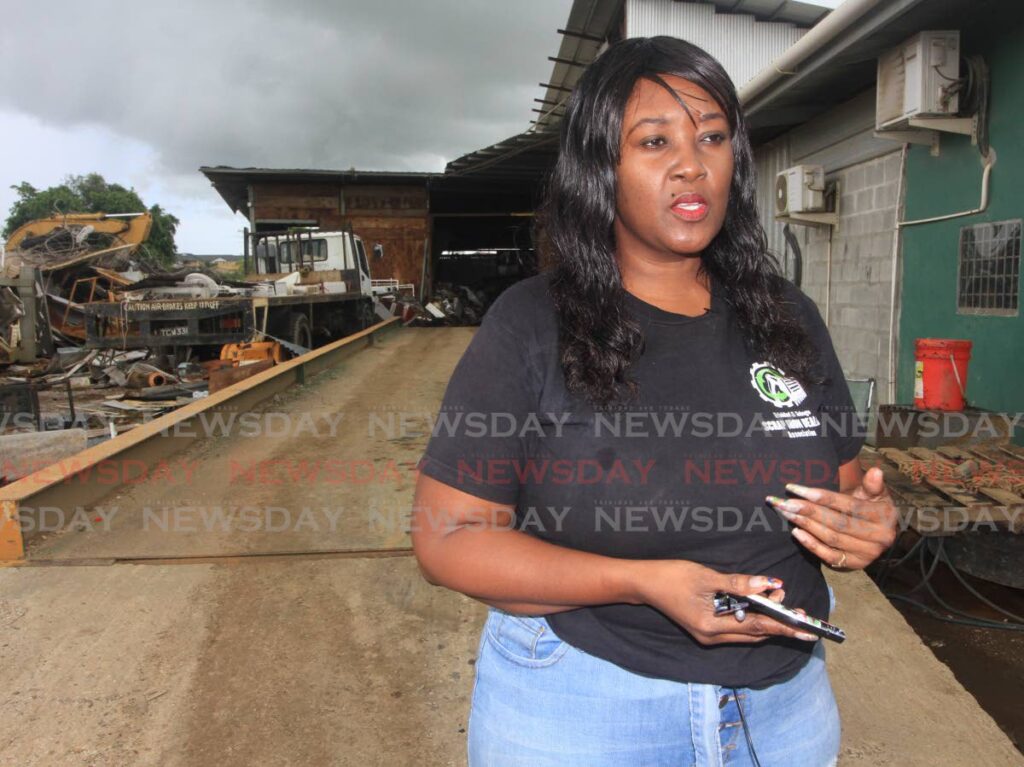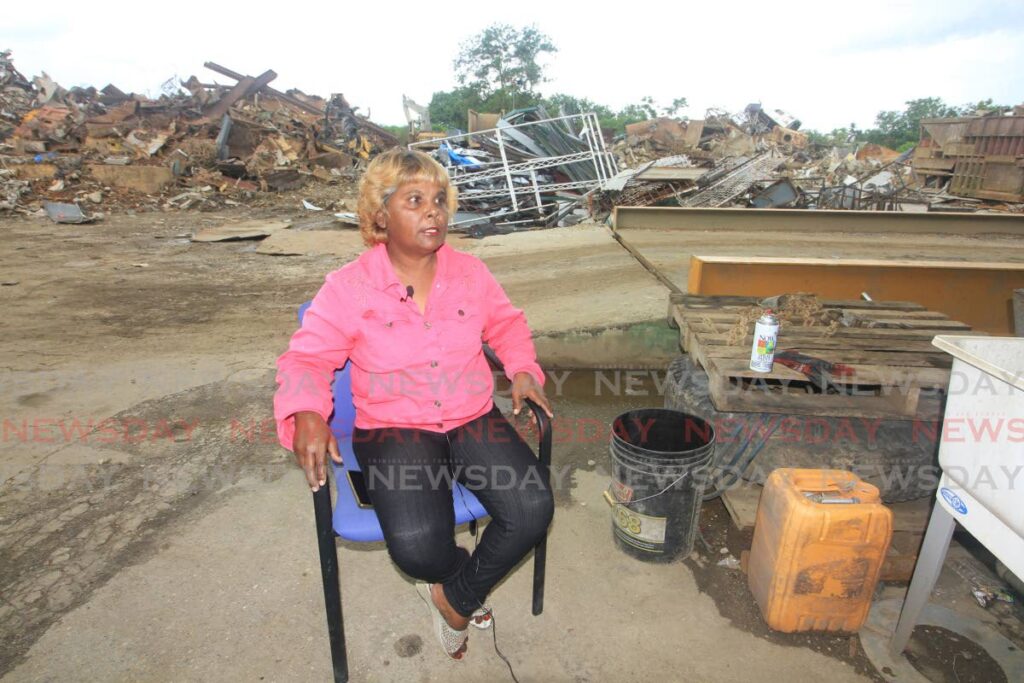Why women get into the scrap iron industry? It's honest work

THE scrap iron industry is perceived as a male-dominated field.
But a handful of women are working to change that notion and leave their mark on the emerging industry.
These women act as secretaries, drivers, scrap collectors and trade coordinators of old and scrap metal under the TT Scrap Iron Dealers Association.
A dealer can make up to $2,000 per ton in one day, depending on the quality and type of steel. These big returns have attracted thousands to the industry, some of which have taken illegal avenues to source scrap iron causing frustration to citizens and businesses.
As a result, the Government has recently put a six-month ban on the export of scrap and old iron to deal with a surge in theft at private and state agencies. Though this could affect the process the industry has made, the women feel they are obligated to find ways to keep its operations alive during the downtime.
For most of them, the decision to go into the industry was taken under a desperate need to make money. But it wasn’t too long after they developed a deep attraction with the operations and the satisfying returns.
Scrap iron dealer Nancy Pierre hopes more women will see the benefits of getting into the handling and exportation of scrap iron.
In an interview with Sunday Newsday she said, “It’s an honest job, just do it the right and legal way and everything would go smoothly for you. Some people look at us as scavengers and that’s too low but if they see how this industry is growing they would see how every struggling parent can benefit.”
Pierre is the driver and her husband collects and loads scrap iron onto their truck.
One important routine as a scrap iron worker is to protect her skin. “I walk with gloves and sanitiser and I make sure my skin is moisturised and I am careful not to get any cuts, that’s why even as someone who deal up with old dangerous iron my skin looks good.”

For her, it isn’t difficult to balance family and work life because she has developed flexible working hours.
“Yes, it is very hard work. I work from Sunday to Sunday but I’m my own boss. I was never thinking about coming into this industry I just needed cash.
Pierre was the owner of a furniture and appliance store before she became a scrap iron dealer.
“I was held up twice, once with a gun, second time they put a knife to my neck and I almost got killed. And I close it down. I also have a furniture factory but it wasn’t lucrative.
She handled a private transportation business before getting into the industry but was left without work in the first lockdown in 2020 to prevent the spread of the covid19.
Her family found themselves in debt and was unable to sustain their mortgage. They temporarily lost their home and after a court case an order was made for the family to pay all instalments on time, and if two payments are missed they will be evicted.
“I needed to pay my bills so I told my husband about the scrap yard and it was our best means to support ourselves at that time.”
“This industry has saved my home, buy groceries and get savings out of it but now with the six-month ban, I’m asking anyone who can help me to help.
Karen Salazar, a mother of eight, told Sunday Newsday she never regretted making a career change nine years ago.
Before getting into the industry she worked in a restaurant in east Trinidad.
“After getting married and moving down to south I see the activities in the scrap iron happen and I realised there is potential here to take care of myself and kids.”
Salazar buys old scrap iron from collectors and resells it.
“Being a woman in this industry I see myself growing because it is profitable. I call my own shots, make my own money, regulate my time.”
Salazar believes more women would be attracted to the business if there was not a stigma attached to the industry.
Former nail technician Willetta Wilson entered the industry as an administrative volunteer following a neck injury.
“I knew some people in the scrap industry and I was assisting them with a symposium in 2020 because I have some training in event management.
While working behind the scene she naturally fell into the secretary position and was later voted in.
“This was not an industry I thought I would have been in at all. I was always attracted to things that are more male-oriented, (but) I’ve always been comfortable. But scrap industry it’s not something I planned to get into. It happened by chance."
Wilson is responsible for dealing with the media, planning events and all communications aspects of the association.
On her end, there wasn’t any stigma from relatives.
“Most of them are in the industry so it wasn’t a problem. They never said anything negative directly to me.”
“It seems to be a very lucrative industry to get in. We have people like me, and Nancy, who have set the way so there is no barrier for women getting in. Even if you want to go pick up the scraps, there may be challenges in terms of weight but a lot of these women have helpers most of the time.
“But if you can only lift 40 pounds so be it, there is no real barrier.”
She also thinks the industry has room for female entrepreneurs to own and operate a scrap yard.
“You can have your employees go out. If you have a little investment to start a small yard the right way, following the rule, then why not. They can get it done and make money.”
From where she sits, she said she had no challenges as a woman in the industry but is aware of challenges experienced by others.
“There is potential in the industry for women. There are a lot of single women out there with kids who have to make it, and if this is a way they can without having a formal education, then they can get into the industry.”
She lamented the industry has a long way to go and the ban will turn those who are interested away.
“During our sensitisation drive I have met a lot more women silently in the industry and they have similar challenges, they have their kids to feed and they say they have to find it. That’s why I’m worried about the ban. I can easily channel back to doing nails but what about them?
She encourages women to reach out to the association. “Let’s connect. We may not always agree on everything but the industry needs that support going forward. If we didn’t have the six-month ban in place. We still need to put things in place so that.”


Comments
"Why women get into the scrap iron industry? It’s honest work"